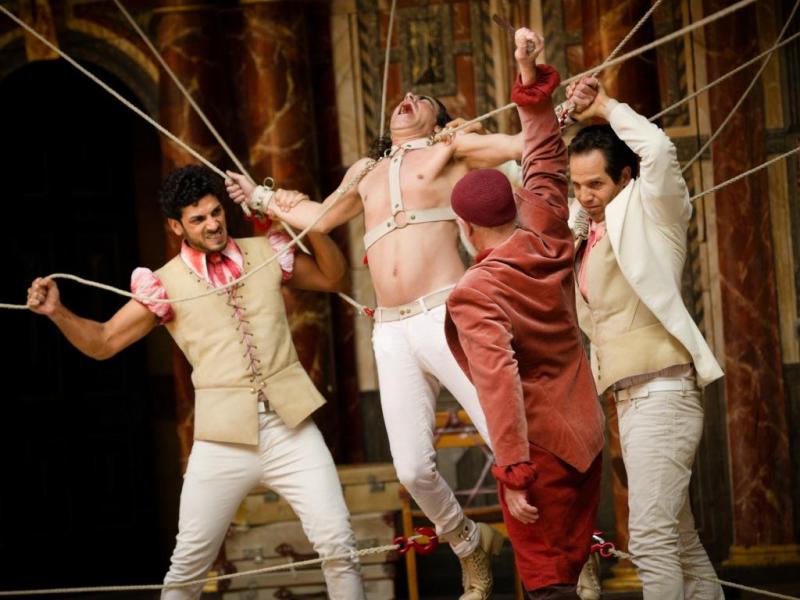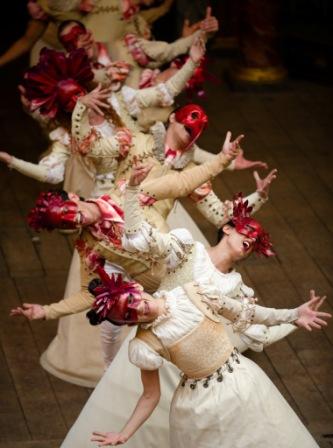Globe to Globe: The Merchant of Venice, Shakespeare's Globe | reviews, news & interviews
Globe to Globe: The Merchant of Venice, Shakespeare's Globe
Globe to Globe: The Merchant of Venice, Shakespeare's Globe
Habima National Theatre go for a pound of flesh without much soul

There's a good deal of irony in the most controversial production of the Globe to Globe season turning out to be one of the least interesting. The Merchant of Venice was performed by Israel's Habima National Theatre, a company which has incurred the wrath of some for performing in the Occupied Territories, and there were protestors tonight, mainly of the flag-waving variety. The drama in the yard and the galleries was not matched on stage, I can unhappily report.
Played as a straight period piece, with velvet and doublets and ruffles for miles, this Merchant gave us a rather listless interpretation, despite the cheerful carnivalesque opening, continuous music and frequent playing for laughs. The playing for laughs - Jessica comically hesitating whether to drop her father Shylock's gold into Christian Lorenzo's arms, for example - undermined the tension, as did overly rapid scene changes: when Shylock discovers Jessica has gone, he should be allowed more than 15 seconds to mourn.
 Shylock, however, played by Jacob Cohen, was perhaps the one thing this production got right. (Of course, it's an important one to get right.) Freed from the grand shackles of Shakespeare's language, Cohen made Shylock seem… ordinary. Small. A real person instead of a pantomime villain or larger-than-life showman, as he often is.
Shylock, however, played by Jacob Cohen, was perhaps the one thing this production got right. (Of course, it's an important one to get right.) Freed from the grand shackles of Shakespeare's language, Cohen made Shylock seem… ordinary. Small. A real person instead of a pantomime villain or larger-than-life showman, as he often is.
Forsaking the opportunities to grandstand, Cohen gave us a man who went about his business and wanted nothing from people but civility, which the Venetians never gave him. He was driven to his extremity - he did not always occupy it. The bookending images of Shylock wrapped in his prayer shawl and then looped similarly in the endless contract he signed with Antonio hinted at some greater theatrical imagination than we saw for most of the play. (Regarding the contract, one day someone is going to do a really good anti-capitalist version of Merchant.)
As to race, Habima seemed to have something to say. We saw the princes of Morocco and Arragon, played by minor cast members, black up or moustache up and adorned with national costume, then act as stereotypes, thus highlighting the other forms of cultural crudity that can be read into the play. This reading - that there are lots of xenophobic caricatures in Merchant beyond Shylock - did effectively point out the double standards applied to portrayals of Shylock: he's not the only funny foreigner, you know. Still, one idea was not enough to give the evening the dynamism it sorely needed.
Explore topics
Share this article
Add comment
The future of Arts Journalism
You can stop theartsdesk.com closing!
We urgently need financing to survive. Our fundraising drive has thus far raised £49,000 but we need to reach £100,000 or we will be forced to close. Please contribute here: https://gofund.me/c3f6033d
And if you can forward this information to anyone who might assist, we’d be grateful.

Subscribe to theartsdesk.com
Thank you for continuing to read our work on theartsdesk.com. For unlimited access to every article in its entirety, including our archive of more than 15,000 pieces, we're asking for £5 per month or £40 per year. We feel it's a very good deal, and hope you do too.
To take a subscription now simply click here.
And if you're looking for that extra gift for a friend or family member, why not treat them to a theartsdesk.com gift subscription?
more Theatre
 Dracula, Lyric Hammersmith review - hit-and-miss recasting of the familiar story as feminist diatribe
Morgan Lloyd Malcolm's version puts Mina Harkness centre-stage
Dracula, Lyric Hammersmith review - hit-and-miss recasting of the familiar story as feminist diatribe
Morgan Lloyd Malcolm's version puts Mina Harkness centre-stage
 Reunion, Kiln Theatre review - a stormy night in every sense
Beautifully acted, but desperately grim drama
Reunion, Kiln Theatre review - a stormy night in every sense
Beautifully acted, but desperately grim drama
 The Code, Southwark Playhouse Elephant review - superbly cast, resonant play about the price of fame in Hollywood
Tracie Bennett is outstanding as a ribald, riotous Tallulah Bankhead
The Code, Southwark Playhouse Elephant review - superbly cast, resonant play about the price of fame in Hollywood
Tracie Bennett is outstanding as a ribald, riotous Tallulah Bankhead
 The Lady from the Sea, Bridge Theatre review - flashes of brilliance
Simon Stone refashions Ibsen in his own high-octane image
The Lady from the Sea, Bridge Theatre review - flashes of brilliance
Simon Stone refashions Ibsen in his own high-octane image
 Romans: A Novel, Almeida Theatre review - a uniquely extraordinary work
Alice Birch’s wildly epic family drama is both mind-blowing and exasperating
Romans: A Novel, Almeida Theatre review - a uniquely extraordinary work
Alice Birch’s wildly epic family drama is both mind-blowing and exasperating
 The Producers, Garrick Theatre review - Ve haf vays of making you laugh
You probably know what's coming, but it's such great fun!
The Producers, Garrick Theatre review - Ve haf vays of making you laugh
You probably know what's coming, but it's such great fun!
 Not Your Superwoman, Bush Theatre review - powerful tribute to the plight and perseverance of Black women
Golda Rosheuvel and Letitia Wright excel in a super new play
Not Your Superwoman, Bush Theatre review - powerful tribute to the plight and perseverance of Black women
Golda Rosheuvel and Letitia Wright excel in a super new play
 Cow | Deer, Royal Court review - paradox-rich account of non-human life
Experimental work about nature led by Katie Mitchell is both extraordinary and banal
Cow | Deer, Royal Court review - paradox-rich account of non-human life
Experimental work about nature led by Katie Mitchell is both extraordinary and banal
 Deaf Republic, Royal Court review - beautiful images, shame about the words
Staging of Ukrainian-American Ilya Kaminsky’s anti-war poems is too meta-theatrical
Deaf Republic, Royal Court review - beautiful images, shame about the words
Staging of Ukrainian-American Ilya Kaminsky’s anti-war poems is too meta-theatrical
 Laura Benanti: Nobody Cares, Underbelly Boulevard Soho review - Tony winner makes charming, cheeky London debut
Broadway's acclaimed Cinderella, Louise, and Amalia reaches Soho for a welcome one-night stand
Laura Benanti: Nobody Cares, Underbelly Boulevard Soho review - Tony winner makes charming, cheeky London debut
Broadway's acclaimed Cinderella, Louise, and Amalia reaches Soho for a welcome one-night stand
 The Pitchfork Disney, King's Head Theatre review - blazing with dark energy
Thrilling revival of Philip Ridley’s cult classic confirms its legendary status
The Pitchfork Disney, King's Head Theatre review - blazing with dark energy
Thrilling revival of Philip Ridley’s cult classic confirms its legendary status
 Born with Teeth, Wyndham's Theatre review - electric sparring match between Shakespeare and Marlowe
Rival Elizabethan playwrights in an up-to-the-minute encounter
Born with Teeth, Wyndham's Theatre review - electric sparring match between Shakespeare and Marlowe
Rival Elizabethan playwrights in an up-to-the-minute encounter

Comments
Another jaded review from the
I completely agree,
There was an anti capitalist
Of the 27 productions I saw